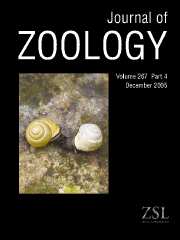Crossref Citations
This article has been cited by the following publications. This list is generated based on data provided by
Crossref.
Cope, David R.
2003.
Variation in daily and seasonal foraging routines of non‐breeding barnacle geese (Branta leucopsis): working harder does not overcome environmental constraints.
Journal of Zoology,
Vol. 260,
Issue. 1,
p.
65.
Rowcliffe, J. Marcus
Pettifor, Richard A.
and
Carbone, Chris
2004.
Foraging inequalities in large groups: quantifying depletion experienced by individuals in goose flocks.
Journal of Animal Ecology,
Vol. 73,
Issue. 1,
p.
97.
Beauchamp, G.
2005.
Low Foraging Success of Semipalmated Sandpipers at the Edges of Groups.
Ethology,
Vol. 111,
Issue. 9,
p.
785.
Inger, Richard
Bearhop, Stuart
Robinson, James A.
and
Ruxton, Graeme
2006.
Prey choice affects the trade-off balance between predation and starvation in an avian herbivore.
Animal Behaviour,
Vol. 71,
Issue. 6,
p.
1335.
Poisbleau, Maud
Fritz, Hervé
Valeix, Marion
Perroi, Pierre-Yves
Dalloyau, Sébastien
and
Lambrechts, Marcel M.
2006.
Social dominance correlates and family status in wintering dark-bellied brent geese, Branta bernicla bernicla.
Animal Behaviour,
Vol. 71,
Issue. 6,
p.
1351.
Amano, T.
Ushiyama, K.
Fujita, G.
and
Higuchi, H.
2006.
Costs and benefits of flocking in foraging white‐fronted geese (Anser albifrons): effects of resource depletion.
Journal of Zoology,
Vol. 269,
Issue. 1,
p.
111.
Leone, Erin Hoerl
Estevez, Inma
and
Christman, Mary Catherine
2007.
Environmental complexity and group size: Immediate effects on use of space by domestic fowl.
Applied Animal Behaviour Science,
Vol. 102,
Issue. 1-2,
p.
39.
Beauchamp, Guy
2007.
Vigilance in a selfish herd.
Animal Behaviour,
Vol. 73,
Issue. 3,
p.
445.
Hirsch, Ben T
2007.
COSTS AND BENEFITS OF WITHIN‐GROUP SPATIAL POSITION: A FEEDING COMPETITION MODEL.
The Quarterly Review of Biology,
Vol. 82,
Issue. 1,
p.
9.
Leone, E.H.
and
Estévez, I.
2008.
Space Use According to the Distribution of Resources and Level of Competition.
Poultry Science,
Vol. 87,
Issue. 1,
p.
3.
Leone, Erin Hoerl
and
Estevez, Inma
2008.
Use of space in the domestic fowl: separating the effects of enclosure size, group size and density.
Animal Behaviour,
Vol. 76,
Issue. 5,
p.
1673.
Carere, Claudio
Montanino, Simona
Moreschini, Flavia
Zoratto, Francesca
Chiarotti, Flavia
Santucci, Daniela
and
Alleva, Enrico
2009.
Aerial flocking patterns of wintering starlings, Sturnus vulgaris, under different predation risk.
Animal Behaviour,
Vol. 77,
Issue. 1,
p.
101.
Pearse, Aaron T.
Reinecke, Kenneth J.
Dinsmore, Stephen J.
and
Kaminski, Richard M.
2009.
Using simulation to improve wildlife surveys: wintering mallards in Mississippi, USA.
Wildlife Research,
Vol. 36,
Issue. 4,
p.
279.
Hirsch, Ben T.
2011.
Within-group spatial position in ring-tailed coatis: balancing predation, feeding competition, and social competition.
Behavioral Ecology and Sociobiology,
Vol. 65,
Issue. 2,
p.
391.
Schellinck, Jen
and
White, Tony
2011.
A review of attraction and repulsion models of aggregation: Methods, findings and a discussion of model validation.
Ecological Modelling,
Vol. 222,
Issue. 11,
p.
1897.
Hirsch, Ben T.
and
Morrell, Lesley J.
2011.
Measuring marginal predation in animal groups.
Behavioral Ecology,
Vol. 22,
Issue. 3,
p.
648.
Beauchamp, Guy
Ruxton, Graeme D.
and
Ebensperger, L.
2012.
Vigilance Decreases with Time at Loafing Sites in Gulls (Larus spp.).
Ethology,
Vol. 118,
Issue. 8,
p.
733.
Beauchamp, Guy
and
Ruxton, Graeme D.
2012.
Changes in antipredator vigilance over time caused by a war of attrition between predator and prey.
Behavioral Ecology,
Vol. 23,
Issue. 2,
p.
265.
Beauchamp, Guy
2012.
Foraging speed in staging flocks of semipalmated sandpipers: evidence for scramble competition.
Oecologia,
Vol. 169,
Issue. 4,
p.
975.
Zoratto, Francesca
Manzari, Leonardo
Oddi, Ludovica
Pinxten, Rianne
Eens, Marcel
Santucci, Daniela
Alleva, Enrico
and
Carere, Claudio
2014.
Behavioural response of European starlings exposed to video playback of conspecific flocks: Effect of social context and predator threat.
Behavioural Processes,
Vol. 103,
Issue. ,
p.
269.


